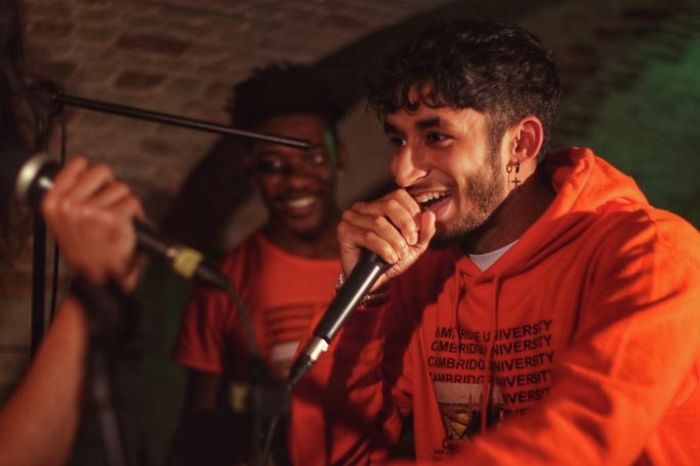‘We’ve never grown up’: The Undertones are still kicking
45 years on from hit single ‘Teenage Kicks’, drummer Billy Doherty talks to Varsity about his awkward teenage years, and punk in the time of the Troubles

45 years on from their hit single ‘Teenage Kicks’, The Undertones are still touring. Ahead of their appearance in Cambridge next month, I sat down with band member Billy Doherty to discuss life as an Undertone. After he checks that I can keep up with his Northern Irish accent, we get going.
“We’re very real and very truthful. That ethos has always remained in the band and I think that’s what’s kept us together. Integrity, being honest, that’s what it’s all about to me.” After finding out that I was born in 2003, Billy voluntarily gives a whistlestop tour of punk. “Punk was really about a drive to make a statement and challenge the way people thought and did things [...] being rebellious and changing the status quo.”
The Undertones’ early music is centred around adolescent angst, a theme which stands the test of time. “We were very awkward,” he admits – the sources of which included “feeling uncertain and not being able to chat up a girl”. Billy jests, “I never had that kind of trouble now.” He sings the praises of fellow band member John O’Neill for his ability to “condense those worries” into their lyrics.
“The horrors of the Troubles were explicit at the time, I just wanted to listen to records”
Billy first met his band mates on their walks to school in Derry: “We just got on really well.” When asked if The Undertones’ music was influenced by the Troubles, his answer is emphatic. “No. The music was complete escapism from the whole thing … even though the horrors of the Troubles were explicit at the time, I just wanted to listen to records.”
“Now I’m older, I look back and see how absolutely dreadful it was. That’s not to say we didn’t realise what was going on, being Catholic, which we all are, the injustice was explicit at the time.” Billy knew that the record deal (a consequence of recognition from legendary DJ John Peel) was a way out for the group: “We didn’t have to go through the ordeal of looking for a job – we managed to escape that.”
Comparing the 1970s to the present, Billy laughs when I ask if he thinks the band would “make it” nowadays. “I think it would be exceptionally difficult,” he says, citing the “disposable” nature of current music streaming. “Back in our day, you’d have to listen to the whole thing, and you’d get a better feel for the record and what the artist was about.”
Out of those who have managed to make it, there are some who have caught his eye, particularly the Arctic Monkeys’ drummer, Matt Helders. I press him to name a favourite. “Those two girls – what do you call them? I’ve got a really atrocious memory.” We list different bands who could match that description, finally landing on “Chaise Longue! Something about a Chaise Longue!” – Wet Leg.
“We’ve never grown up … we’re still trying to figure it out”
Thinking forward to their upcoming gig in Cambridge, we discuss how the band’s experience of touring has changed since the 1970s. “The thing is, it doesn’t really sit too well with me. I’m a home bird.” But he describes some moments of absolute euphoria in the last year. “About four months ago we did a show, there was this moment we were playing that I thought, this is a great band to be in, I’m so happy to be playing with these guys … there was just a great commitment and energy. You know when things just feel right? God it was amazing, that burst of joy.”
While the band members aren’t what Billy labels “pally-wally” – their core values, shared convictions and love for what they do have allowed them to keep going strong.
Following the disclaimer that “we’ve never grown up” and that “we’re still trying to figure it out, even 40 years on”, Billy offers some words of advice to young musicians at Cambridge. “If you feel deep down in your heart that what you’re doing is right, then that’s OK, just go for it … just be honest, and have some self-belief.”
For The Undertones, their music is about expressing things that are difficult, and Billy concludes that he is “exceptionally grateful” to have been part of it.
 Comment / Cambridge’s tourism risks commodifying students18 April 2025
Comment / Cambridge’s tourism risks commodifying students18 April 2025 News / Cambridge student numbers fall amid nationwide decline14 April 2025
News / Cambridge student numbers fall amid nationwide decline14 April 2025 News / Greenwich House occupiers miss deadline to respond to University legal action15 April 2025
News / Greenwich House occupiers miss deadline to respond to University legal action15 April 2025 Comment / The Cambridge workload prioritises quantity over quality 16 April 2025
Comment / The Cambridge workload prioritises quantity over quality 16 April 2025 News / Varsity ChatGPT survey17 April 2025
News / Varsity ChatGPT survey17 April 2025





